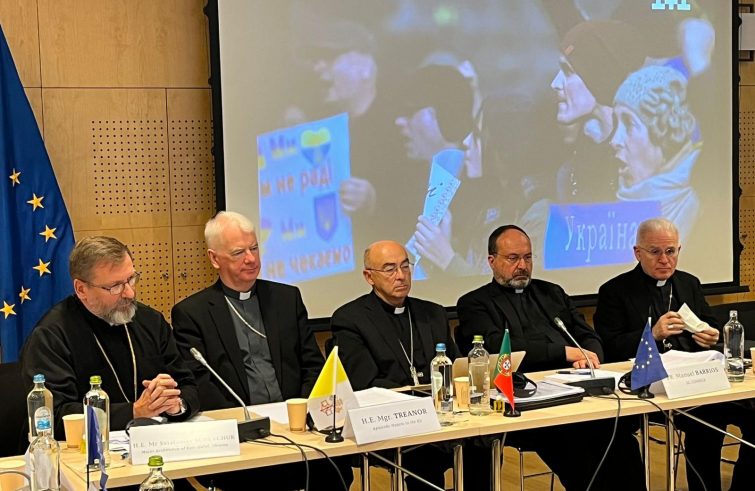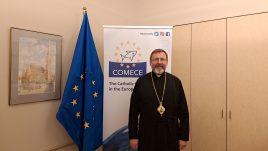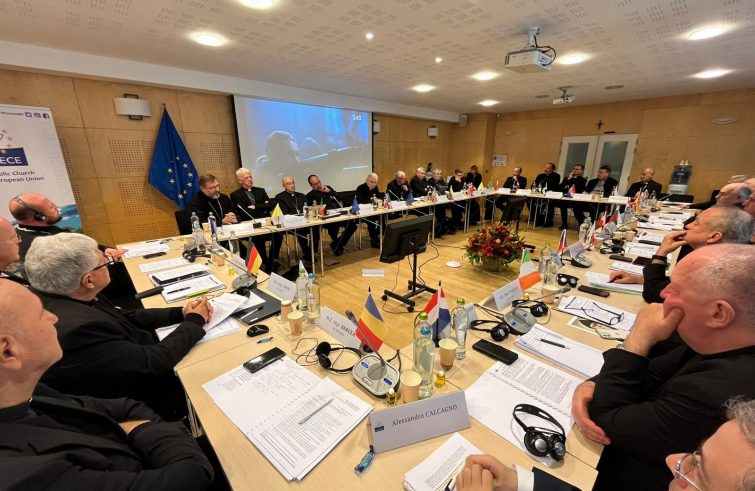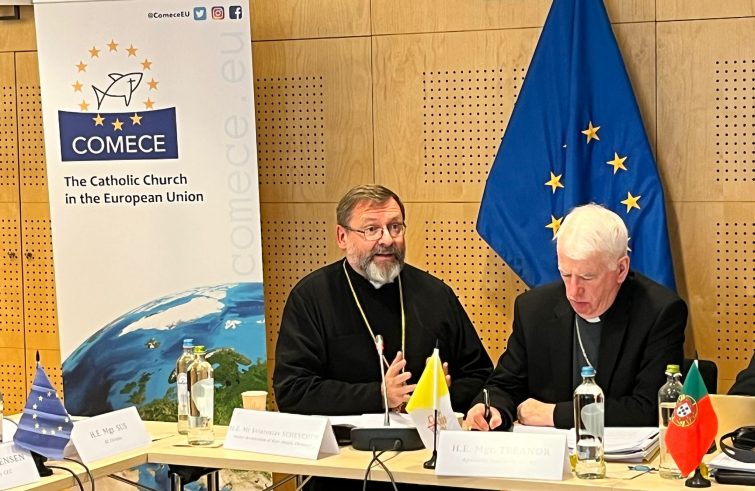
(from Brussels) “In the past year, October was the cruelest month in Ukraine”, in terms of the number of victims, both Ukrainian and Russian. “A massacre.” But “we cannot resign ourselves to the idea of war.” “War is always a tragedy, and, as such, it must end with a peace agreement.” Interview with His Beatitude Sviatoslav Shevchuk, head of the Ukrainian Greek Catholic Church. SIR met him in Brussels, where he is attending the Plenary Assembly of the Bishops of the EU (COMECE) and meeting representatives of the European Commission: Olivér Várhelyi, European Commissioner for Enlargement and Neighbourhood Policy, and Michael Siebert, Executive Director for Eastern Europe. On Wednesday November 8, the President of the European Commission, Ursula von der Leyen, announced at a press conference: the first green light to opening accession negotiations of a number of countries, including Ukraine, ushers in a new season for the European Union.

Your Beatitude, what was your reaction to this announcement?
It may be a coincidence, but it was exactly 10 years ago that I came here to Brussels with the heads of Churches and religious organisations gathered in the Pan-Ukrainian Council. We came here to proclaim the will of the Ukrainian people to rejoin the family of European nations. At the European summits we presented a document bearing the signatures of the leaders of the Christian churches and the Jewish and Muslim communities. Today that document is signed with the blood of the sons and daughters of the Ukrainian people. It was to defend this European project that the Revolution of Dignity broke out in Ukraine and the Russian invasion of Crimea and Donbass erupted in 2014. And it is the political denial of this people’s identity that is at the origin of the military confrontation we are witnessing today. Today I feel that the European Union has finally opened its doors.
If this step had been taken 10 years ago, perhaps so many victims could have been spared.
H.B. Shevchuk addressing the EU Bishops gathered in plenary meeting (Photo A. Di Maio)
Why are you saying this?
Europe is a family of nations. A civilisation, not just an economic union. Had we not been left to our own devices, had we not prioritised the economy over the dignity of the human person, had we allowed the people to choose, recognising them not as the object of negotiations between Europe and Russia but as the agents of their own future, then, 10 years ago, many human lives could have been saved.
 How important are von der Leyen’s words today?
How important are von der Leyen’s words today?
They are an encouragement, a moral encouragement as well as a psychological encouragement. They are a message to us that all those victims who were defending the European identity of our people did not die in vain. At long last, finally, the Ukrainians are being recognised for who they are, what they live for and what they die for.
What does the European Union mean to you?
It stands for the values of human dignity, human life. The common good. It is clear to everyone that the war in Ukraine is not a clash between two nations, but between two projects.
On the one side, there is Russia, which wants to restore a glorious past. This past is an empire that wants to reconquer Ukraine, its old colony, and place it under a dictatorship. On the other side is Ukraine, which wants to move forward, which is looking to the future and has no intention of returning to the past.
What does Russia fear?
If Ukraine really became a free and democratic country, it would be a strong provocation for the other post-Soviet countries. It would be proof and testimony that freedom is possible. It is a strong provocation.
Much is being said, and rightfully so, about the situation in the Middle East and very little about the war in Ukraine. What news is there? We experience the Holy Land’s tragedy as our own. We feel very close to the Israeli people. Like them, the Ukrainian people are being denied their right to exist. And we feel very close to the Christians of Palestine and the State of Israel. Interestingly, the conflict in the Holy Land broke out on October 7 as a result of the terrorist action of Hamas. In Ukraine, October was the cruellest month of the past year. The Russians sacrificed 1,000 of their own soldiers every day and Ukrainian prisoners of war were shot en masse. A massacre.
The war in Ukraine rages on, with the risk of becoming a silent war, a forgotten war. As was the case ten years ago with Donbass and Crimea. All of this points to the urgent need to plan for the future with a diplomatic agenda.
 There is hardly any peace diplomacy, even here in the European Union. Speaking of which, how is Card. Zuppi’s mission progressing? While I was attending the Synod in Italy, I had the opportunity to go to Bologna and visit the Cardinal. We agreed that it is important not to get used to war, which is always a tragedy. However, it is equally true that every war ends with a peace agreement. And this peace agreement can be forged by us today. Much has been said about the Ukrainian children abducted by the Russians. This is an issue on which, unfortunately, no progress has been made so far. We must insist, we must continue to seek all possible ways to free these children. Peace-building requires the virtue of perseverance in goodness. We must not give up. War has a vicious and malignant logic. The men who wage it ultimately become its slaves. War seizes everything and the man who falls victim to it is no longer able to break out of this cage. From a human point of view, the situation may indeed be a cause for despair. But if we look at the commitment of the Founding Fathers of the European project, Schumann and Adenauer, they did not allow themselves to be overcome by despair. Instead, they built Europe out of the ashes of the Second World War as a European peace project involving all nations. We must follow their example.
There is hardly any peace diplomacy, even here in the European Union. Speaking of which, how is Card. Zuppi’s mission progressing? While I was attending the Synod in Italy, I had the opportunity to go to Bologna and visit the Cardinal. We agreed that it is important not to get used to war, which is always a tragedy. However, it is equally true that every war ends with a peace agreement. And this peace agreement can be forged by us today. Much has been said about the Ukrainian children abducted by the Russians. This is an issue on which, unfortunately, no progress has been made so far. We must insist, we must continue to seek all possible ways to free these children. Peace-building requires the virtue of perseverance in goodness. We must not give up. War has a vicious and malignant logic. The men who wage it ultimately become its slaves. War seizes everything and the man who falls victim to it is no longer able to break out of this cage. From a human point of view, the situation may indeed be a cause for despair. But if we look at the commitment of the Founding Fathers of the European project, Schumann and Adenauer, they did not allow themselves to be overcome by despair. Instead, they built Europe out of the ashes of the Second World War as a European peace project involving all nations. We must follow their example.









